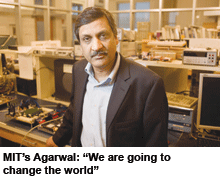Dr. Anant Agarwal looks out the window of his new office on the seventh floor of the Massachusetts Institute of Technology’s Stata Center for Computer, Information, and Intelligence Sciences and muses aloud — and without evident irony — about the future of online education. “We’re going to change the world,” says Agarwal, who is heading edX — the MIT-Harvard University collaboration to provide online education. Courses from edX could reach 1 billion people, he says. And, no, he isn’t trying to compete with other universities which plan to teach online. There is room for everyone, he says.
 But Harvard and MIT — two of the biggest and most prestigious US universities — do seem to be choosing sides in a showdown over which institutions will most quickly and effectively usher in (and make cash from) the online education revolution.
But Harvard and MIT — two of the biggest and most prestigious US universities — do seem to be choosing sides in a showdown over which institutions will most quickly and effectively usher in (and make cash from) the online education revolution.
The University of California, Berkeley has just signed up with edX. But rival platform Coursera’s original partners — the University of Michigan, the University of Pennsylvania, Princeton University and Stanford University — have been joined by about a dozen major research institutions, including MIT’s arch-rival, the California Institute of Technology.
Harvard’s pairing with MIT — which had already set up its MITx platform — in edX’s $60 million (Rs.330 crore) launch is a major milestone, says Kevin Carey, director of the education policy programme at Washington thinktank the New America Foundation. “I think it was because they were reading the newspapers and were afraid they were going to be left behind,” he says.
Meanwhile, former Stanford professor Sebastian Thrun, who (with Peter Norvig) helped make online education a phenomenon with his introduction to artificial intelligence class (last year it attracted 160,000 students worldwide), has started a company called Udacity, backed by venture capital.
This consolidation follows years during which the open-courseware and online education movements were low-key, collegial affairs promoted as altruistic means of making higher education free and available to all. Now they are increasingly about figuring out how to make (or at least not lose) money.
“Many of my colleagues and I have been experimenting with online learning, but we hadn’t done it in an organised global fashion,” says Dr. Agarwal. “We let 1,000 flowers bloom in the past couple of decades. Now the race is on to be the first to offer, and profit from, a critical mass of ‘massive open online courses’.”
Coursera, which has $16 million (Rs.88 crore) of venture backing, plans to launch 100 courses this autumn and says it has registered 680,000 students in more than 40 countries. It also talks of offering certificates of completion for $30-80 (Rs.1,650-4,400) per credential, per course. Dr. Agarwal says edX is talking with private testing companies about providing examinations for a fee to students who want to prove they have successfully completed its courses.
The market, says Dr. Agarwal — himself the product of the Indian Institutes of Technology, a system that admits barely 1 percent of applicants — is vast. “There’s a huge gap between what’s available to feed this thirst for education in the world, and the education we provide,” he says.
Zakaria quits Yale board
A prominent US journalist recently outed for copying parts of an article from a rival publication, has resigned from his position on a university’s governing board. Fareed Zakaria, a host on television channel CNN and editor-at-large of Time magazine, stepped down from the Yale Corporation, telling president Richard C. Levin he needed to shed some of his workload, reports Yale’s New Haven Register.
“My service at Yale is the single largest commitment of time, energy and attention outside of my writing and television work,” said Zakaria. “The work of the Yale Corporation needs and deserves such attention, but I simply do not have the capacity to do it and keep up with my main professional obligations.”
The decision comes after an editorial in the newspaper suggested that Zakaria should step down from the post after admitting to lifting passages from an article in The New Yorker without attribution, for one of his Time columns.
(Excerpted and adapted from Times Higher Education)





















